After 5 years since the last 20.03, the Code::Blocks IDE finally announced new 25.03 stable release few days ago.
The new Code::Blocks 25.03 added support for MinGW64, MSYS2, MSVC17 and TDM compilers, C++ standards 23 and 26 (and their gnu extensions), as well as new -std=c23 and -std=gnu23 options on GCC13 and newer.
It also added Jens Lody’s DisplayEvent core plugin, support building on Linux with riscv64 architecture type, and enhanced HI-DPI support.
Other changes include ability to import/export global variable sets, “Reset all” button in color editor, support drag’n’drop files to virtual folders, and UI for automatic source folders aka project globs. For more, see the 25.03 changelog.
How to Install Code::Blocks 25.03 in Ubuntu
Here I’m going to introduce 3 ways to install the new IDE release in Ubuntu. They are:
- Option 1: official Debian package.
- Option 2: unofficial Flatpak package, runs in sandbox.
- Option 3: compile Code::Blocks 25.03 from the source.
Option 1: official Debian package.
Code::Blocks offers official binary packages for Linux, Windows, and macOS, which are available to download at the link below:
For Linux, it so far contains only i386 (for old 32-bit x86 processors) and amd64 (for modern Intel/AMD platform) packages for Debian 11 and Debian 12, though they work in my case in Ubuntu 22.04, Ubuntu 24.04, and Ubuntu 24.10.
1. First, choose to download
- either “
codeblocks_25.03_amd64_debian12.tar.xz” for Linux Mint 22, Ubuntu 24.04 & higher - or “
codeblocks_25.03_amd64_debian11.tar.xz” for Linux Mint 21, Ubuntu 22.04.
2. After downloaded the package, decompress then navigate to the extracted folder. In that folder, you’ll see the source tarball as well as list of .deb packages.
3. Right-click on blank area in that folder, then click “Open in Terminal” to open up a terminal window with that folder as working directory. Finally, run the commands below one by one to install:
- First, if you have v20.03 installed from system repository, it’s HIGHLY recommended to remove it first to avoid issues!!! To do so, backup your project first then run command:
sudo apt remove --autoremove codeblocks codeblocks-common codeblocks-contrib libcodeblocks0t64 libwxsmithlib0t64 libcodeblocks0 libwxsmithlib0
- Next, run the command below to install all local .deb packages in current directory (the extracted 25.03 folder in the case).
sudo apt install ./*.deb
After installation, either run codeblocks from terminal to launch the IDE, or search for and start from application menu or Gnome overview depends on your DE.
Option 2: unofficial Flatpak package
For choice, there’s also an unofficial Flatpak package that can be installed in most Linux using sandbox environment. It supports both amd64 (modern Intel/AMD) and arm64 (e.g., Raspberry Pi) platforms.
- To install the package, first press
Ctrl+Alt+Ton keyboard to open terminal, then run command to install the daemon package:sudo apt install flatpak
For non-Debian/Ubuntu based systems, see the official setup guide to enable Flatpak support.
- After that, run the single command below to install the IDE as Flatpak package:
flatpak install https://dl.flathub.org/repo/appstream/org.codeblocks.codeblocks.flatpakref
After installed the package, search for and launch either from start menu or Gnome overview (log out and back in if app icon not visible), or by running the command below in terminal:
flatpak run org.codeblocks.codeblocks
Option 3: Compile Code::Blocks 25.03 from the source
For other platforms and users who have specific requirements, the IDE is easy to compile from the source tarball.
NOTE: This option was only tested in Ubuntu 24.04 LTS.
1. Install build dependencies
First, launch “Software & Updates” utility and enable “Source Code” from the first tab.
Next, run the commands below one by one to refresh cache, and install the dependency packages for building Code::Blocks:
sudo apt update
sudo apt build-dep codeblocks
2. Download the Source tarball
Next, go to the link below and select download the source tarball of the new Code::Blocks 25.03:
After that, decompress and right-click on the extracted folder, and select “Open in Terminal” to open the source folder as working directory in terminal:
3. Configure the source
When terminal opens and automatically navigate to the source folder, either configure with default options by running the command below:
./configure
Or use ./configure --help to print configure options, then configure with your custom options. For example, set installation directory to /usr, and enable debugging with command:
./configure --prefix=/usr --enable-debug
4. Compile & Install
After successfully configured the source, you may then run the command below to compile:
make -j4
Here -j4 tells to start 4 threads in parallel to speed up the process. You may change the number 4 depends on how many CPU cores you have.
When done, use the command below to install:
sudo make install
5. After built from source successfully, try running the command below to start the IDE:
codeblocks
If it was configured with default options, then it may output error that looks like:
codeblocks: error while loading shared libraries: libcodeblocks.so.0: cannot open shared object files: No such file or directory
Or:
codeblocks: symbol lookup error: codeblocks: undefined symbol: _ZN19UserVariableManager5SetUIESt10unique_ptrI16UserVarManagerUISt14default_deleteIS1_EE
That is because your system don’t know where to find the run-time libraries. To fix the issue, simply run command below to create a custom configuration file under /etc/ld.so.conf.d:
sudo nano /etc/ld.so.conf.d/lib-local.conf
Then insert the target location, /usr/local/lib, in the case, finally press Ctrl+S to save and Ctrl+X to exit.
To apply the change, use sudo ldconfig command.
6. (Optional) As long as you keep the source folder, you may open that folder in terminal and run the command below to uninstall:
sudo make uninstall
Uninstall Code::Blocks 25.03
To uninstall the IDE installed via .deb packages, open terminal (Ctrl+Alt+T) and run command:
sudo apt remove --autoremove codeblocks-common codeblocks-contrib-common codeblocks-headers codeblocks-libwxcontrib0 libcodeblocks0 wxsmith-headers
To uninstall the Flatpak package, use this command instead:
flatpak uninstall org.codeblocks.codeblocks
And, you may run flatpak uninstall --unused to remove useless run-times that may free up some disk space.



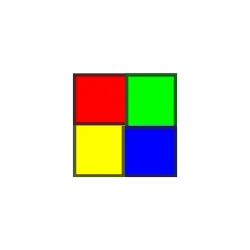
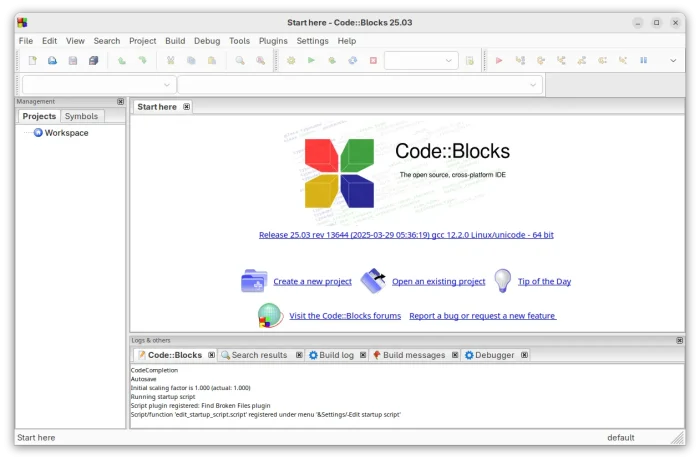
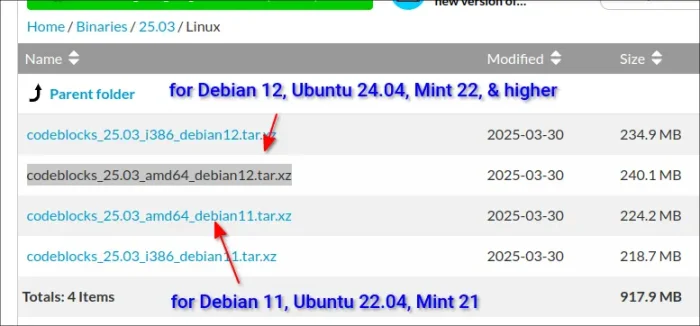
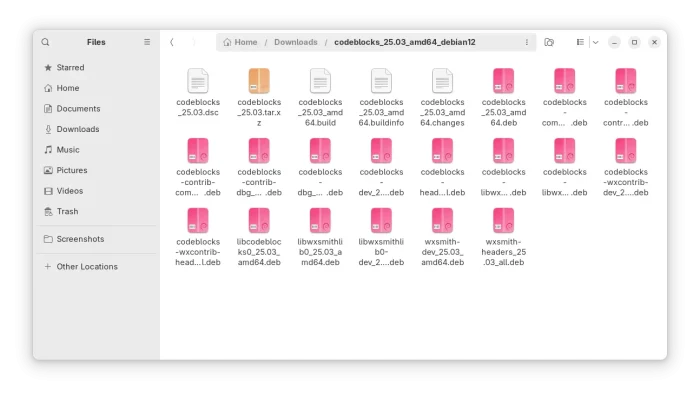
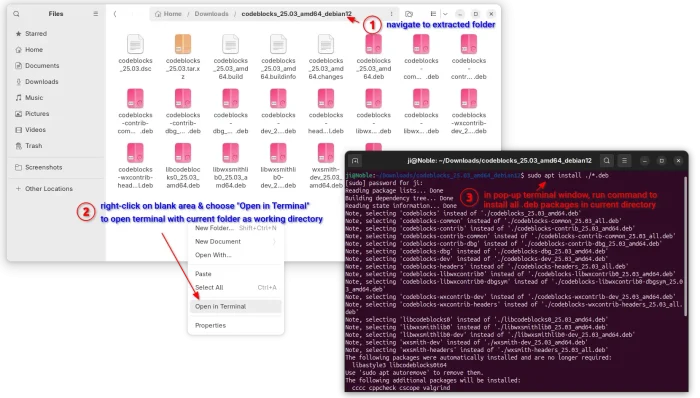
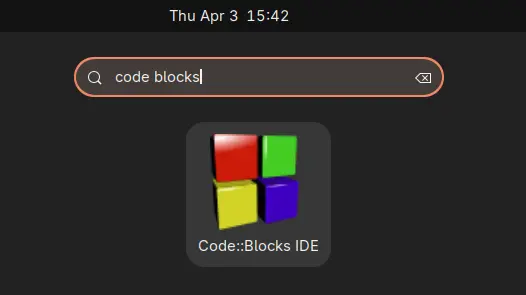
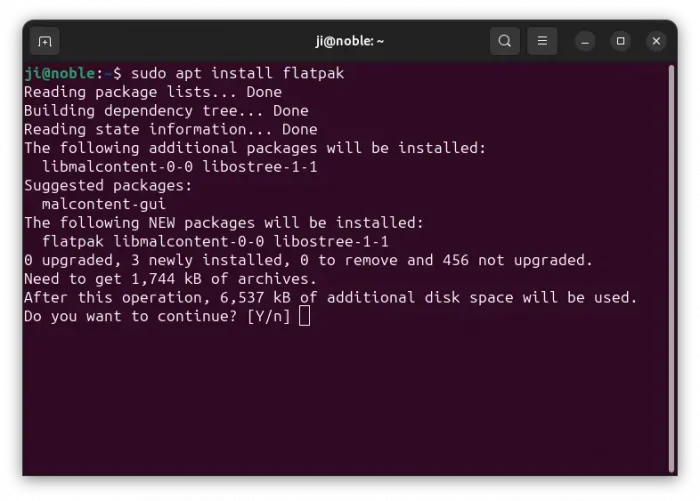
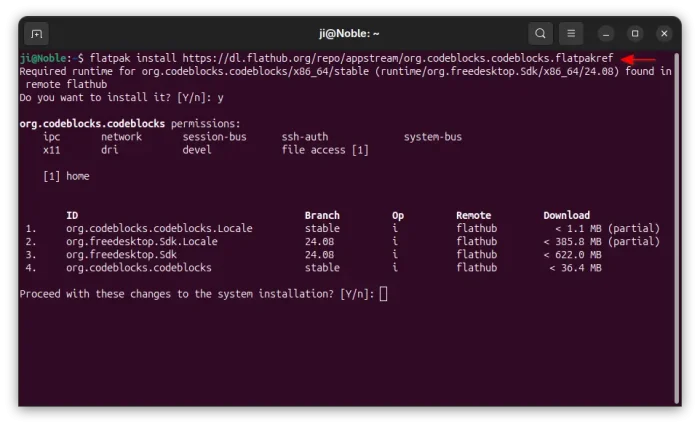
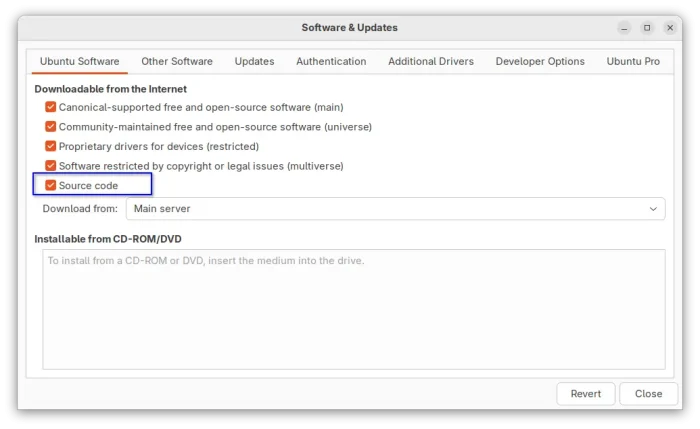
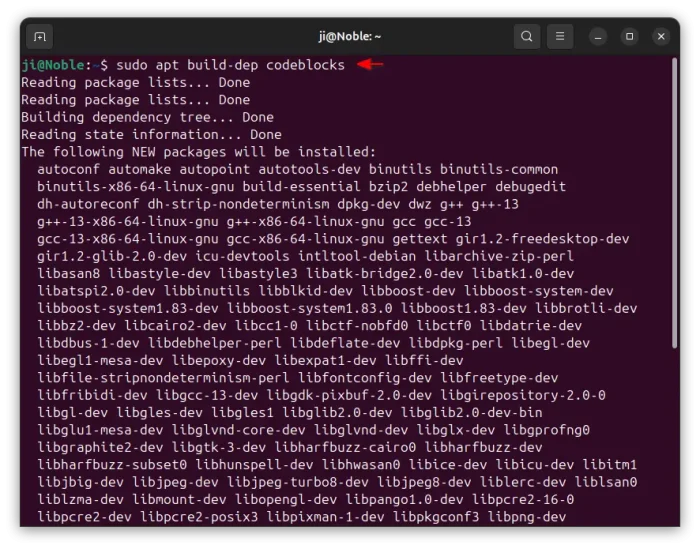
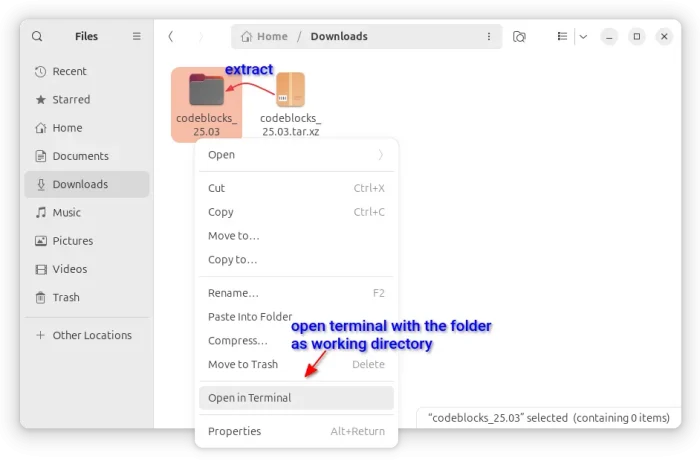
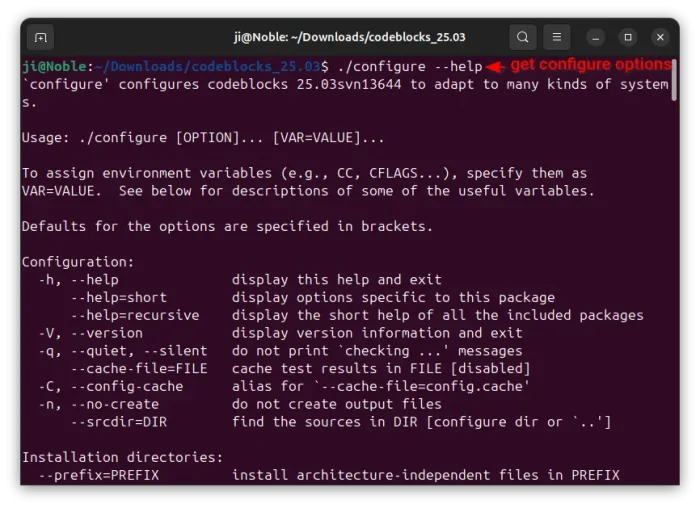
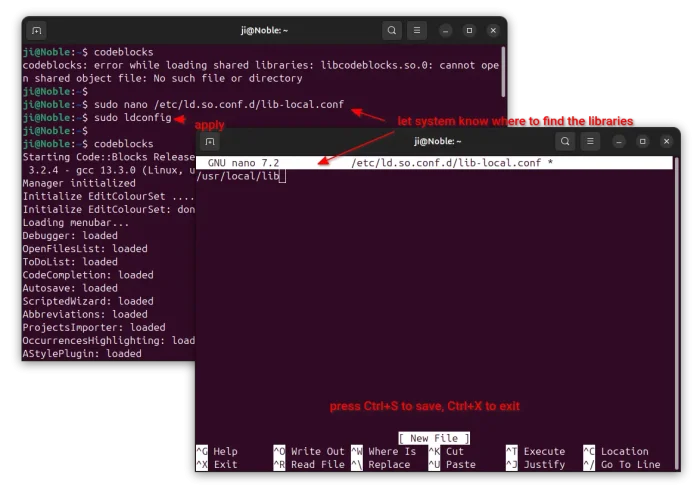

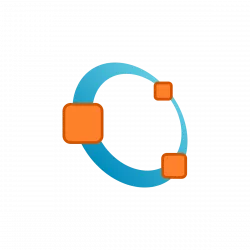

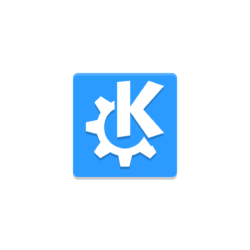






Main issue — buggy tab switching with hotkeys — still not fixed.